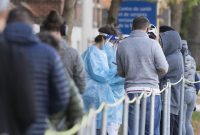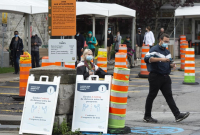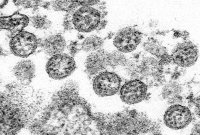Support strong Canadian climate journalism for 2025
Premier Francois Legault called on Quebecers to make "sacrifices" and avoid contact with others over the Thanksgiving weekend as authorities reported more than 1,000 new cases of COVID-19 for the seventh time in eight days.
"Resist the temptation to see your friends and family," Legault told a news conference in Quebec City Friday.
Health authorities reported 1,102 new COVID-19 infections Friday, bringing the total number of cases in the province to 84,094.
Legault said the fact that the daily case rate has stayed relatively stable over the past week is a sign his government's approach to the pandemic is working. The government has imposed strict, partial lockdowns on the province's most populated areas, forcing bars, restaurant dining areas, gyms and other venues to close. Indoor and outdoor private gatherings are also prohibited.
He urged people not to let down their guard by getting together over the weekend. "Yes, I'm asking you to make sacrifices," he said, adding that they were necessary to protect the vulnerable elderly and to ensure children can continue going to school.
As of Wednesday, active cases of COVID-19 had been reported at 774 public and private schools, with 1,451 students and 318 staff members infected. More than 1,000 classes have been closed, affecting about three per cent of all elementary and high school students.
Health authorities reported 22 additional deaths from the novel coronavirus Friday, including four that occurred in the past 24 hours and 18 from earlier. One death previously thought to have been caused by COVID-19 was found to be from other causes, bringing Quebec's death toll is 5,936.
There are now 433 people being treated for COVID-19 in hospital, an increase of eight from the day before, with 67 people in intensive care, one less than the prior day.
On Friday afternoon, Quebec's National Institute of Excellence in Health and Social Services warned that Montreal and surrounding regions could run out of hospital beds within four weeks.
The institute, whose modelling looks only at the number of beds designated for COVID-19 patients and does not consider staff levels, warns that the Montreal metropolitan area could run out of intensive care beds before the end of October and regular hospital beds in early November if the current rate of new hospitalizations continues.
On Wednesday, Legault warned that major surgeries may have to be postponed to take pressure off an "already fragile" health-care system.
Dr. Matthew Oughton, an infectious disease specialist at Montreal's Jewish General Hospital, said in an interview this week that fatigue and exhaustion among health-care workers is also putting strain on Quebec hospitals.
Hundreds of nurses left the profession during and after the first wave, Oughton said, and he's worried the same thing will happen with medical technologists.
Much of southern Quebec is now at the province's highest COVID-19 alert level, with new restrictions set to take effect in several regions between Montreal and Quebec City beginning Saturday at midnight.
This report by The Canadian Press was first published Oct. 9, 2020
———
This story was produced with the financial assistance of the Facebook and Canadian Press News Fellowship.





Comments